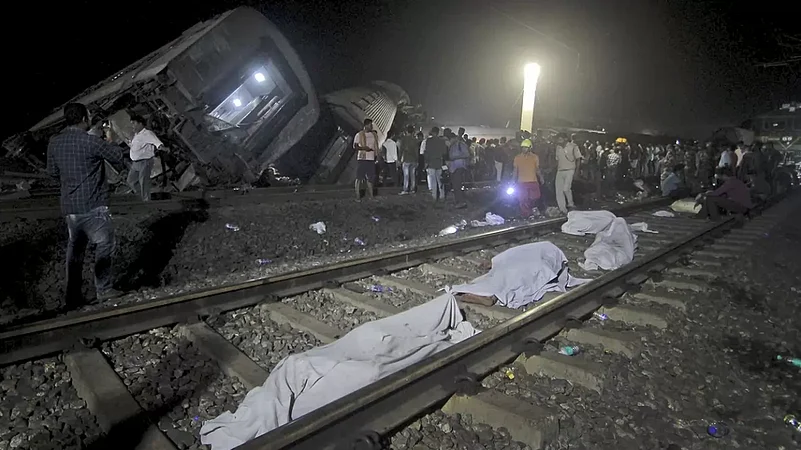In the crumpled remains of trains in Odisha's Balasore, the dreams and hopes of many also died. Beyond the death toll, the number of injured, and the jargon of investigative reports of the Odisha train tragedy are the people affected by it. A total of 275 people lost their lives and over 1,100 were injured. As of Monday, only 108 dead have been identified.
18-year-old Chotu, who was travelling to Kerala with his father, a construction worker, to seek work to build a pucca house in their village in West Bengal. While the father and son left their homes with dreams to build a new home, the father returns with the body of his son who was among the 275 killed.
While the father, Suklal, had been working in Kerala for a long time, it was the first time his son Chotu was travelling with him.
While Suklal is critical and his son is dead, the fate of some of the 10 others from the same village travelling in the Coromandel Express is not known as the villagers say they have been missing.
Saddam Sheikh, 28, hailing from a village close to Suklal and Chotu, also lost his life. He leaves behind a one-month-old son.
Tales of survival
While several hundred were evacuated from the crumpled remains of the Coromandel Express and Bengaluru-Howrah Express, the second train involved in the accident, several made it out on their own.
Thirteen migrant workers from the Bhatar Police Station area were also travelling to Kerala on that train. Though injured in the accident, they managed to return home on their own in two groups.
"We were in our seats when the accident happened around 7 pm. Our coach overturned after a loud noise. Somehow, we managed to get out through the window. Tiptoing through the bodies, we reached the main road and from there, went to Balasore town. We took a bus from Balasore and reached Howrah," says an injured Sarafat Ali Sheikh.
Sheikh Putu, who is also injured, says that they were going to Kerala to work as construction labourers.
He adds, "After the pile-up, our coach got atop another bogey. We also managed to get out through the window. It was an indescribable situation with bodies scattered all around and injured persons lying on one another. After we got out, the police removed us from the spot. We started calling up other people in our group. And after a few of us gathered, we hired a minivan and returned to Bhatar."
Putu claims they did not get any help in Odisha.
He adds, "After returning home, we were taken to the Bhatar hospital. From there, one person was sent to the Burdwan Medical College and Hospital. All of us are well."
Memory of horrors
Survivors often carry the scars of the disasters they see with them for a long time. While post-traumatic stress disorder (PTSD) is much more commonly-acknowledged, the awareness is not much in India, but the horrors the survivors of the Odisha train accident recount suggest the trauma they have endured is unlikely to dissipate soon and it was more than shock and disbelief for them.
A woman, who is a native of Kerala said she had only seen accidents on television and when she experienced it herself, she was terrified. "The bed sheets given to passengers were used to carry the injured and it turned red with blood; a dreadful scene," she tells in Chennai.
Wearied by the tragedy and the long journey as well, a man recounts seeing blood, severed limbs and bodies of men and women lying scattered and tormenting.
Suganya Radhakrishnan say that passengers experienced a sudden terrible shake and her spouse on the upper berth fell down and sustained injury.
"As we got down from our coach and moved forward looking for help, what we saw was indescribable; we just could not stand the trauma and cries and only then we realised the magnitude of the accident," the woman from a village in southern Theni district tells.
Love poems on the tracks
In stark contrast to the horrors all around the tracks at Balasore, sheets with love poems in Bengali are found lying on the tracks.
The sheets are understood to be belonging to a passenger. The identity and the fate of the poet is unknown.
Scattered sheets of paper have poems in Bengali professing love. The jottings on torn pages of a diary with sketches of elephants, fish, and the sun on the other side, were probably written during the leisure time of a passenger.
"Alpo alpo megh theke halka bristi hoy, chotto chotto golpo theke bhalobasa sristi hoy" (scattered clouds lead to light rains, (while) love blossoms from the little tales we hear)," the handwritten poem said.
Photographs of these pages have gone viral on social media.
Another half-finished poem which was on another loose page reads, "Bhalobeshei toke chai sarakhhon, achis tui moner sathe (With love I need you at all times, you are there in my mind at all time)".
Till now no one has come forward to claim the poems or relationship with the poet, whose fate too is unkown.
(With PTI inputs)


























